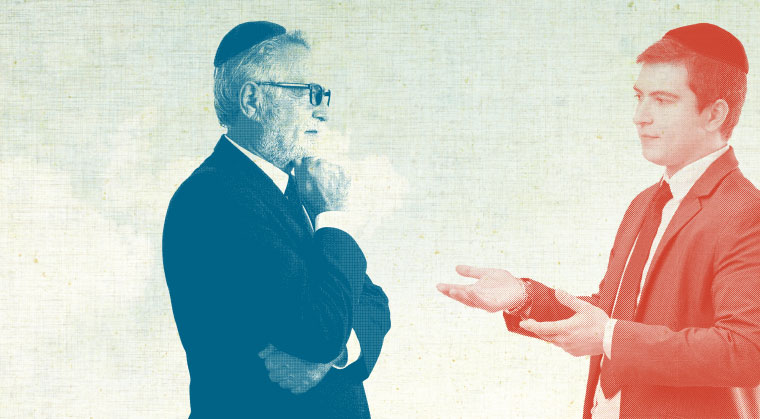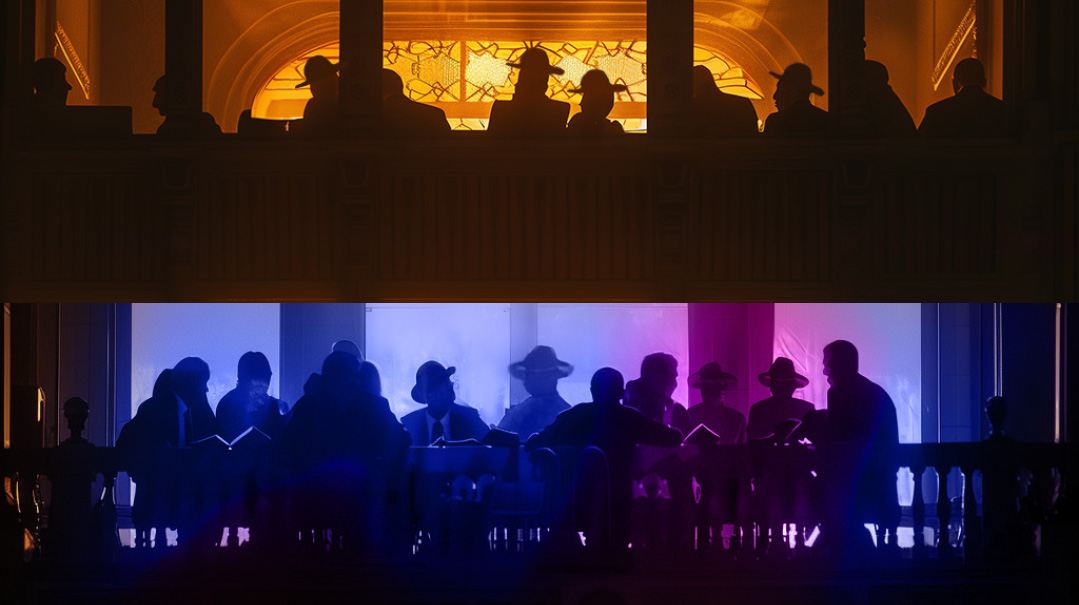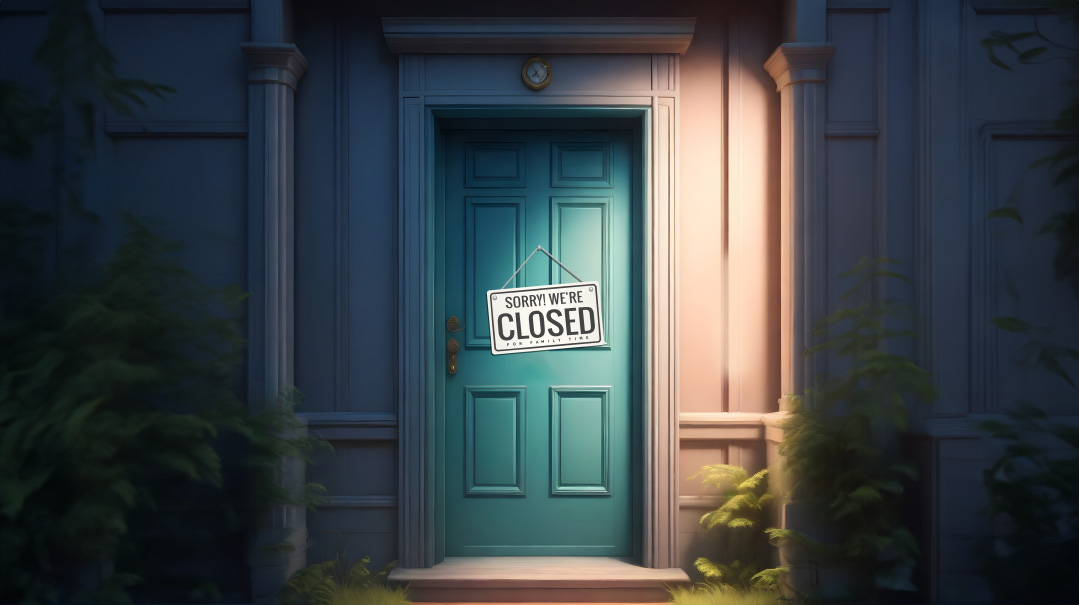Search Committee


Shmuel: Efficiency means streamlining, and that means we can’t involve everyone.
Moshe: Haven’t I earned the right to have my voice heard?
Shmuel
Honestly, Rabbi Weiss couldn’t have picked a worse time to make aliyah. Although any shul president could tell you that there’s never a good time to have the rav move away.
Not that he hadn’t given us fair warning. He’d told the board at least a year ago that he’d been with us for over 30 years, most of his children lived in Eretz Yisrael, and he was strongly considering acting on his dream to retire there. So we saw it coming, but you know how it goes. Time crept along, we’d made an effort at finding a new rav, but the most promising candidate had fallen through at the last minute. Too soon a year had gone by, the shul was busy with a seudas preidah and arranging the gift, and before we blinked, it seemed, the Rav was somewhere across the Atlantic and there we were, with a jarringly empty seat at the mizrach wall.
“We’ve got to get serious about this, gentlemen,” I said, opening the board meeting without the usual round of banter. “We’ve had a few résumés submitted but no one who really meets our specific needs. And the shul needs a rav.”
Everyone nodded agreeably except for Benny Cohn, who was scrolling through something on his phone.
“The question is, where to go from here? Keep receiving résumés? Do we advertise? Do we form a search committee and start making calls? Any thoughts?”
Benny put his phone down. “Search committee.”
I nodded; I was thinking the same way myself.
“Do you know what the problem is?” Ezra Lowy said, looking over his glasses and sighing. “It’s just the five of us again, and we each have more than enough to deal with. Searching takes time. It takes phone calls and research and lots of dead ends. I think we need a bigger team.”
He was right.
We spent a few minutes nominating various kehillah members to join the search committee, working out who would approach each one, and adjourned the meeting. Time enough to begin the campaign when we had more manpower.
At the next meeting, we were a bigger group — and there was new energy in the air.
“So, gentlemen,” I launched right in. “We’ve formed this new committee to find a new rav. We need all hands on deck here, making calls and putting out feelers in various communities, investigating potential applicants, researching, and interviewing potential candidates, inviting finalists in for probas, and eventually, hire a new rav to fill the position.”
Heads nodded. There was a seriousness here — the new recruits were clearly aware of the big responsibility — but also a positive, can-do vibe. Hershy Taub threw out a suggestion, a plan for the search process and timeline, and there was a smattering of responses. Benny started taking notes on his phone.
We ended the meeting a productive two hours later. Some promising names had come up; a couple of the guys offered to do some investigating. Benny wanted to convert his rough notes to a thought-out document and e-mail it to all of us.
“Great going, gentlemen. Let’s meet, same time next week, and have an update.”
“How was the meeting?” Shiri asked curiously that evening.
“Yeah, great, much better.” I filled her in. “Hopefully, we’ll have hired someone for the position by, say, Pesach at the latest.”
“I hope so,” she said. “It’s a big job, finding a rav.”
I agreed, but I was optimistic.
The next day, Hershy stopped me after Shacharis. “I think I have another lead, from Lakewood, talented, dynamic, young — I’ll send you the name.”
Levi Sanders also came over with an idea, an older rav, very experienced, from California. Runs a small kehillah out there, he said, maybe he was interested in a change?
I nodded approvingly. “Find out some more details, tell us about him next week. Or send the information to Benny, he’s keeping notes on everything.”
Finally, things were moving. I checked my e-mail — Benny had made good on his word. He’d forwarded a summary of our process, timeline, and most importantly the short list of candidates to the group, and we could begin to divide up the research. Then I noticed another e-mail, from Moshe Rosen. A nice guy, always on time for minyan, he’d always struck me as on the quiet side until recently, when he’d volunteered to run the youth minyan on Shabbos. He probably wanted to check something about the budget. Moshe liked doing things properly.
But it wasn’t.
Moshe was writing, he explained, to express his hurt that there had been a meeting to which he wasn’t invited. Apparently, Moshe felt that he also had what to add, especially in light of his role in the shul’s youth program.
Huh? The search committee? How did he even know? And why did he care?
My first reaction was to roll my eyes. Seriously? The search committee was just a technical arrangement, a way of getting the job done and make sure there were some viable candidates. We wouldn’t be making the ultimate decision; there would be a vote in which Moshe would take part. It wasn’t fun or especially exciting. In fact, I felt like telling Moshe, it’s pretty much just one big headache.
And what did he think? That they could include every community member and shul volunteer in the meeting? It would be disaster: a hundred opinions, everyone disagreeing, he knew how these things worked. They’d never get through a meeting without sidetracking, forget finding a rav.
I hesitated, unsure what to reply. Then I just left it. At the next meeting, I’d discuss with the committee if we should send out a questionnaire or something, give everyone a chance to share his opinion at this early stage.
The committee was split over that, some thought it was a nice idea, others disagreed. Benny pegged it a waste of time and would delay the process.
“We’re already behind schedule,” he reminded us.
I didn’t really want anyone to get hurt. Ezra agreed to draft a quick e-mail to be sent to our membership list, informing the kehillah that the search for a new rav was underway, and any suggestions could be e-mailed in response and would be shared with the group and given due consideration.
I peeked at the responses later that week. A nice bunch. Well, that was to be expected — we had a large kehillah, with a lot of diversity and strong-minded individuals. I just wondered how helpful this was going to be.
I couldn’t resist reading a few of the responses, even though I didn’t really have the time.
Thanks for reaching out. It’s so important that the shul has a CHANGE!!! It was a wonderful era with Rabbi Weiss at the helm of the shul, however the time is ripe now for something new and different. Times are changing and what worked 30 years ago DOESN’T WORK NOW!
I stopped reading that one, doubtful. Was that the general sentiment in the shul? That things needed changing?
I clicked on the next e-mail, from an elder member of the kehillah. Thoughtful, formal vocabulary, no caps lock.
The transition should be as seamless and smooth as possible. Rabbi Weiss was everything we could wish for in a rav, and the best thing would be to find something as close to that as we can! Could we possibly persuade his oldest son to move back from Lakewood?
When I showed the pages of conflicting opinions round at the next board meeting, Benny shook his head tiredly.
“Shmuel, it’s nice that you gave them the opportunity for this, but really. It ain’t working. You can see that. There are a hundred responses here with at least a thousand opinions. We’re never going to make them all happy, so why bother even asking?”
There were murmurs of agreement.
“Letting everyone in here would just cause bad feeling,” Hershy said sagely. “There’s no way there’d be an agreement on a decision.
“And besides, the shul needs a strong team that can take care of things,” Benny added. “Not some wishy-washy group that needs everyone’s approval.”
They were right that we wouldn’t get anywhere by trying to take everyone’s individual preferences into account. And we’d done our best, selecting some voices from the crowd, reviewing different options.
“But you have to realize,” Levi Sanders said quietly, “some people get very hurt by not having a say.”
Danny Silver — another veteran board member — interjected at the same time, “Look, if we had a rav, we could ask advice. But we don’t. And we’re not going to get one if we don’t take a stand and make some decisions here.”
The room was quiet. He waved a hand at the discarded pile of response forms.
“See what happens when anyone joins the debate? It’s a circus. Older, younger, new, old. Red fish, blue fish, it’s like a Dr. Seuss story. We’ll never get everyone to agree. Better not to give choices, just bring in decisions, wrap them up nice and positive, and people are usually happy. Let them have a yes-no vote when we’ve decided who’s the right man for the job, and zehu!”
He finished by slapping the table lightly, for emphasis. I realized that most of the others were looking at me for a final word.
“Look,” I said slowly. “I think it was a good thing that we saw what happened, what people think. And it seems pretty clear that there’s not really an option other than to go on as a team and find a rav ASAP. Once we’ve identified the right person, we can get more guidance on issues like this, if it comes up again.”
Benny Cohn looked up from his phone to give his approval: “Well said, Shmuel.”
The meeting adjourned after we’d narrowed down the potentials to four promising candidates. The project was going smoothly, and by the time I left, I was feeling better. We were doing the right thing — soon a new rav would be inaugurated and everyone would be happy. This whole issue would fade into the background.
But as the days went by, I had an uncomfortable feeling that the issue was only getting worse. Something had shifted in the atmosphere at shul. People were whispering more, giving me bitter looks. Meyer Stern made some comment to me about giving everyone an equal say in things, and then a few other guys made similar remarks.
“All the problems start when a minority of people take the majority of the power,” I overheard Sender Fried telling a group of men after Maariv.
I pretended not to hear. But I had no doubt where this particular problem had started.
If I could tell Moshe one thing, it would be: Just because you’re not making the decisions doesn’t mean you don’t count. Efficiency means streamlining, and that means we can’t involve everyone.
Moshe
When Libby and I moved to a new community a few years after our marriage, one of the things we liked best was the shul.
“It’s such a warm community,” Libby said happily, that first Shabbos. “So many of the women said hello and introduced themselves.” She giggled. “Not that I remember any names or anything!”
“There’s plenty of time to learn names,” I told her. I was smiling, too. The rav of the shul, Rabbi Weiss, had been very welcoming, and I liked what I saw of the community. I was looking forward to becoming a part of things at the shul.
And at first, it was great. I got to know some of the guys, Rabbi Weiss was sincere and approachable, and the shul offered various shiurim, classes, and programs. After a while, though, I began to feel a hint of unease.
“It’s like the same five people are doing everything around there,” I complained to Libby, in a rare quiet moment. “Shmuel Gordon, you know, the shul president? So, he’s a great person and all that, but it’s him and a few other machers who run everything. It’s like they’re the camp counselors and the rest of us are the little kids coming to their programs.”
Libby looked a little uncomprehending. “I don’t know, Moshe, maybe no one else wants to take responsibility? I think it’s really nice of them, actually.”
“I just, I mean, we’ve been here a few years already. I feel like I’d like to be more involved, you know?”
Libby smiled. “That’s really sweet, Moshe, it’s so nice of you. Why don’t you just offer? By the ladies, it’s all voluntary. Anyone can join the kiddush committee or the Neshei... I’m on the rotation for kiddush setup, it’s definitely not an exclusive club. I’m sure they’ll be happy if you want to take something on.”
I didn’t think so, but she was so innocent and hopeful, I couldn’t put a damper on it. “Maybe,” I said, noncommittal.
It took a few weeks until I mustered up the courage to approach Shmuel Gordon. Libby notwithstanding, I wasn’t placing any bets on a positive response, but it couldn’t hurt to try — could it?
“What can I do for you?”
The president’s brow was furrowed, graying eyebrows meeting by the creases. He looked distracted. Maybe it wasn’t a great time.
“I was just, uh, wondering,” I cleared my throat. Stop stammering! “I, you know, I’ve been around here a while, my wife and I were talking, if there’s anything we could do for the shul, help out...”
He looked confused, then his face cleared. “It’s so generous of you, Reb Moshe, donations can be made out to the shul, I can give you details.”
Uh-oh. “I — sorry. I didn’t mean that. I guess I wasn’t so specific. I meant help out practically, running things, organize shiurim or whatever. Planning events... you know.”
The chairman looked uncomfortable. “Ah. Well, most of the things you’ve mentioned are already in order. I’ll have you in mind, though...”
And with that vague reassurance, he nodded and melted into the crowd.
I couldn’t bring myself to tell Libby, especially when she started getting more involved in the Neshei. Shiri Gordon was in charge of that. Maybe it was different for the ladies.
“I heard they’re looking for someone to run the youth minyan on Shabbos,” Libby said one night. She’d been at a Neshei event for the past couple of hours and her eye held that satisfied gleam of having accomplished something important. “Why don’t you offer?”
I felt a flash of hurt. I had offered, a couple of months back, and Shmuel Gordon had said there was nothing available. I shrugged.
“Just go ahead,” Libby urged me. “They don’t necessarily remember who’s interested in helping out or not. I’m sure they would love to have you involved.”
In the end, I mentioned it in passing to Ezra Lowy, an unassuming member of the board whose opinion somehow carried weight despite — or was it because of? — his quiet nature. His face lit up with a genuine smile.
“That’s so nice of you to offer, Reb Moshe,” he said. “We were just trying to brainstorm who would volunteer for that responsibility... here, let’s talk to the rav right now, he’ll be so happy.”
I shrugged, a little embarrassed. Ezra was nice, but if they were brainstorming who to ask, why didn’t President Shmuel mention that I’d offered to help with anything? But then again, maybe Libby was right, and he’d simply forgotten. He must have a lot on his head.
Rabbi Weiss was, indeed, happy. He shook my hand warmly and kept saying how important it was that the youth have a well-run program, that they should enjoy coming to shul. “There’s Reb Shmuel, let’s speak to him right away. He’ll give you the keys to the youth minyan room.”
As he spoke, the rav signaled the president. Shmuel Gordon was duly pleased to hear my offer. He didn’t mention anything about us having spoken before, just gave me a few details and a key to the room at the back of the shul. I’d been accepted, but somehow it didn’t feel as good as I’d hoped.
Still, I was going to take the opportunity and give it my all. The first thing I noticed about the youth program was what it wasn’t: it lacked energy, a vibe, a freshness. No wonder no one had wanted the job.
I spoke to the rav about it, and he agreed: It was time for a change. Besides the minyanim on Shabbos, I had a number of ideas. I wanted to introduce a Sunday brunch-and-shiur followed by a ball game. I wanted to up the attendance at the youth programs by creating incentives and hiring bochurim to act as madrichim at the events. Maybe even sponsor a Chol Hamoed trip or arrange a Purim shpiel for the shul... really, there was so much more that could be done.
Rabbi Weiss was thrilled. “A shul isn’t a shul without the youth,” he told me. “If you got the kids, you got a future.”
It was true — there were so many communities that were simply dwindling away due to a lack of continuity. We needed a vibrant youth program, something to keep the next generation connected to the community.
Over the next few months, I worked hard to upgrade the youth program, recruiting new bochurim to lead events and splurging on the newest nosh and a few cool prizes. Aside from a few budgetary questions, I didn’t interact much with the president, but Rabbi Weiss himself often asked me how things were going. I discussed with him the ideas I had, changes I wanted to make, frustration at the low budget. He was always encouraging, promised to talk to the board, and kept on thanking me for my efforts.
It was a nice opportunity for me to develop more of a relationship with the rav. He was constantly busy, and I’d always felt bad to waste his time just talking. Now, we had something to discuss. No longer was I plain old Moshe Rosen, sits in the second-last row. I was a somebody in the shul, whatever Shmuel Gordon thought about it.
Then Rabbi Weiss retired.
We all saw it coming; he’d been talking about it for a long time. But I think we were all kind of in denial.
“He’s never going to leave,” Libby told me confidently just a month before. “They’re too attached to the community.”
But apparently, the pull of the Land and their children and grandchildren won out. We attended the lavish seudas preidah, listened to one last speech from our beloved rav, and then that was it — Shmuel Gordon was waiting to drive them to the airport.
I wasn’t surprised to find Libby with red eyes later that night. I felt a little like crying myself.
Over the next few weeks, all the buzz in shul was about the search for a new rav. Rumor had it that the board was busy with the search. I wondered what kind of rav they were looking into. I hoped it was someone who’d be as supportive and encouraging as Rabbi Weiss. Someone who would take an interest in the youth programs and be enthusiastic about new ideas, trying new things.
“I wonder where they’re up to with this new-rav thingy,” I said to brother-in-law Levi one day. He was Libby’s brother, moved to the area a couple of years after us. Levi’s a great businessman, though, and he quickly made a name for himself in the community — and in the shul. Sometimes I saw Shmuel Gordon stop to talk to him. I guess when there are big bucks involved, things are different.
Levi looked a little discomfited. “Ah. Yeah.”
I was surprised; Levi could usually be counted on for a post-Shacharis schmooze. “What, you think they’ve found someone already? You know about it?”
Levi shook his head, then changed it to a nod. “They’re — actually, I’m a little bit involved in it. I guess it’s not a secret. I mean, we had a meeting yesterday, the board and a few other guys, we were throwing around names... so I know there’s nothing concrete yet.” He smiled, relieved now he’d said his piece. “But there were some nice ideas there, and we’re researching them as soon as possible... so hopefully there’ll be a new rav in soon!”
I stared at him, mind caught on the earlier part of his speech.
“But — I mean, how did you know about the meeting?” I asked, then regretted it. That sounded so stupid. “I — I’m just wondering. Are you on the board? Who did the inviting?”
Again, that vaguely uncomfortable look. Levi shifted from one foot to another. “No, really not, it was nothing. Shmuel Gordon, you know, the president — he called me up and I think a couple of others... don’t worry, it wasn’t anything. It’s just that they needed more manpower for the research, I think. I’m happy to help,” he added, shrugging self-deprecatingly.
Happy to help. Of course, if His Honor Mr. Gordon had called him especially to ask. I felt the familiar pinch in my gut. They knew how much I wanted to help out, on the board. They knew how much I invested in the shul — voluntarily! Shouldn’t I have been asked to join the committee? And didn’t my position entitle me to an opinion on the rav we were hiring? After all, a shul only remains strong if there’s a next generation, as Rabbi Weiss constantly told me. So the youth program was a big deal. And the new rav had to be someone who related to that.
But apparently, the board of directors didn’t agree with me.
I was too humiliated to say something directly to Shmuel but too angry to ignore the injustice. In the end, I sent him an e-mail, explaining in what I hoped was a courteous tone that I was disappointed at being excluded from an obviously important meeting, especially in light of my work for the shul and the role I was filling.
I checked my e-mail a few times that evening, but there was no reply. Maybe Shmuel wasn’t a good e-mail checker? But no, whenever I’d e-mailed in the past, about funding or anything, he’d responded within a couple of hours.
I had my answer when we received that questionnaire. So the shul did take me seriously — seriously enough to give everyone something of a say in the matter of the new rav, even if it was slightly different from what I’d anticipated. Still, Libby and I e-mailed a response over. I didn’t have a name to put forward, but I had an opinion — what the community needed, what we wanted to see. Of course, I quoted Rabbi Weiss and mentioned the youth programs issue. I would be very interested to hear what potential candidates felt about encouraging the younger generation to come to shul, to have a part in the community life.
“So, what’s new on the committee?” I asked Levi, a week later. Time enough for responses to have been evaluated, I felt. “Any luck with the opinion-seeking?”
Levi shook his head. “It was a disaster, actually. Way too many contradictory opinions... we couldn’t really do anything with them.”
“Oh.” It was all I said, but I guess the disapproval and hurt flavored the word, because Levi looked apologetic.
“Moshe, it’s not personal, I know you think things through and stuff, but seriously, some people just wrote nonsense. Check how lenient he is with hilchos Pesach. I mean, seriously?”
I nodded half-heartedly. Okay, so don’t listen to every over-the-top opinion, but what happened to those of us who really had something to contribute?
Libby thought it wasn’t worth getting angry over. But I couldn’t resist asking one or two guys if they’d heard about the special committee.
“Really?” Asher Miller asked. “Hey, how come no one asked me to be in the meetings?” He was joking, sort of.
“I guess it’s their right to ask whoever they want,” someone else said.
“I don’t know.” Meyer Stern was thoughtful. “I mean, if it was just the board, okay, I would understand, but to include some regular members and not others? I mean, what made them decide? Who gives the most money?”
Meyer lost his job a few months ago, and we all knew he was struggling. It was a sore point. I quickly changed the subject. “Okay, well, it doesn’t look like there’s anything we can do. I guess we’ll meet the new rav when he’s hired!”
Truth was, knowing I was in good company, I wasn’t so annoyed anymore.
“I’m not sure about that,” Asher said. “Maybe we should complain.”
There were frowns and nods all around. Someone looked around for Gordon. “There he is, I’m going to speak to him.”
I watched him go, suddenly uneasy. None of them had been bothered before. Was it wrong of me to open up all this negativity?
Then I caught myself. They hadn’t been bothered because they hadn’t known. And that wasn’t fair, either. All of us, Miller and Stern and everyone, we’re all part of the shul. We all had a right to a voice, didn’t we?
And besides, if more people were to speak up, maybe things would change. More people could have a say, get involved, be a part of things where it really counted. Wouldn’t that be for the ultimate benefit?
If I could tell Shmuel one thing, it would be: Everyone has what to share, not just the few machers. With all the effort and energy I’ve given to the shul, haven’t I earned the right to have my voice heard?
(Originally featured in Mishpacha, Issue 756)
Oops! We could not locate your form.












